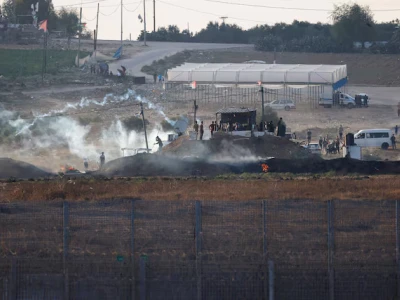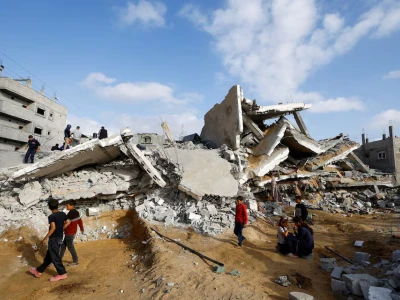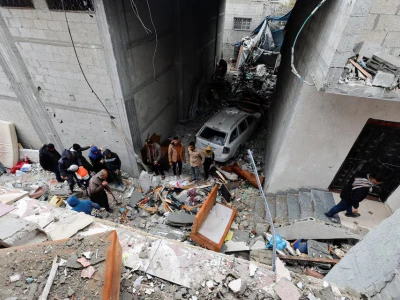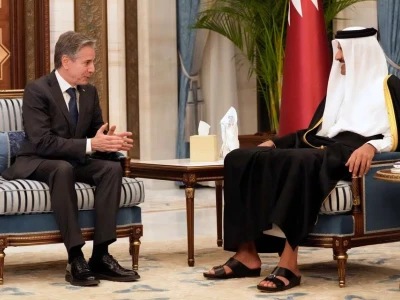
Israeli attack on UN refuge in Gaza prompts rare rebuke from Washington
Some people resorted to dirt roads to try to escape, residents and reporters leaving the area said.
GAZA/JERUSALEM, Jan 24 (Reuters) - Israeli tanks struck a huge U.N. compound sheltering displaced Palestinians on Wednesday, causing "mass casualties", the United Nations said, as Israeli forces battled their way into crowded parts of Gaza without letting people out first.
The attack, which the U.N. said hit a vocational training compound housing 30,000 displaced people in Khan Younis, southern Gaza's main city, prompted rare outright condemnation from the United States of an apparent Israeli military action.
"Mass casualties have taken place, some buildings are ablaze and there are reports of deaths. Many people are trying to flee the scene, but unable to do so," U.N. Humanitarian Coordinator for the Palestinian Territory, James McGoldrick said.
Thomas White, director of Gaza affairs for the U.N. agency UNRWA, said at least nine people were killed and 75 wounded in a building housing 800. The agency's head Philippe Lazzarini, reposting that statement, said the death toll was probably higher.
"The compound is a clearly marked UN facility and its coordinates were shared with Israeli Authorities as we do for all our facilities. Once again a blatant disregard of basic rules of war," Lazzarini posted.
In Washington, U.S. State Department spokesperson Vedant Patel said: "We deplore today's attack on the U.N.'s Khan Younis training centre."
"Civilians must be protected, and the protected nature of U.N. facilities must be respected, and humanitarian workers must be protected so that they can continue providing civilians with the life-saving humanitarian assistance that they need," Patel said.
Washington has raised concerns and asked Israel for information over incidents during the conflict, but has rarely been openly critical of a specific Israeli action.
Hours after the attack as night fell, U.N. staff were still unable to reach the area and all communications were shut down.
Israeli forces have launched their biggest ground offensive in at least a month, encircling the city which is housing hundreds of thousands of people who fled fighting elsewhere in Gaza.
Residents say that unlike in previous Israeli assaults, announcements warning them to leave came only after the operation was underway and the main road out already shut.
The bulk of the 2.3 million-strong population of Gaza is now penned into Khan Younis and the towns just north and south of it. Palestinian officials say the Israelis have cut off and besieged the city's main hospitals, making it impossible for rescuers to reach many of the wounded and the dead.
The Israeli military did not directly address the strike on the vocational centre but released a statement describing the wider area as a base of Hamas fighters. It acknowledged that fighting was taking place in the presence of large numbers of civilians.
"Dismantling Hamas' military framework in western Khan Younis is the heart of the logic behind the operation," it said.
"The area consists of command and control centers, Hamas outposts and Hamas security headquarters. It is a dense area and an area that consists of civilians, it is a place that requires very specific methods of action and precise operations. There is an area with shelters, there are several hospitals, several sensitive sites. We have seen terrorists use these sites."
It also said the unfolding battle required different tactics from its earlier fight in northern Gaza, when it gave residents weeks of warning to evacuate before sending troops in: "What is true for Gaza City is not necessarily true for this area," it said.
'WHERE DO WE GO?'
Palestinian health officials said at least 25,700 people had been killed in Gaza in the war, including 210 in the previous 24 hours. Israel launched its assault to wipe out Hamas after fighters stormed Israeli towns on Oct. 7, killing 1,200 people and capturing more than 240 hostages.
More than half of Gazans are now sheltering in Rafah, a small town just south of Khan Younis against the Egyptian border, which has continued to come under bombardment despite being announced as one of the last safe havens left.
At the site of an air strike that hit a mosque, residents were gathering scattered pages of holy books from among the pulverised ruins. Several men hoisted up a concrete block and pulled away rubble, revealing the legs of a dead man in jeans. When the body was finally pulled out, they carried it on a blanket under a stretcher, chanting religious slogans.
Several bodies were later laid in plastic body bags at a morgue, where relatives wailed in sorrow, clutching the corpses.
Um Khaled Baker, whose son was among the dead, told Reuters they had fled to Rafah because it was supposed to be safe.
"I don't even have a tent to stay in. They bombed us and my son is a young martyr. Where do we go? The old and helpless people? What can they do? Where do we go?"
The Palestinian Red Crescent Society, which runs the Al-Amal hospital in Khan Younis, said troops had blockaded its staff inside and imposed a curfew in the area, including its local headquarters, where three displaced individuals had been killed.
Israel says Hamas fighters operate in and around hospitals, which hospital staff and Hamas deny.
Martin Griffiths, U.N. coordinator of emergency relief, said on Tuesday that 24 people had been killed in strikes on an aid warehouse, U.N. centre and humanitarian zone in the Khan Younis area, and that an aid distribution centre had come under heavy bombardment.
The Israeli military ordered the evacuation of the area on Tuesday, which the U.N. humanitarian office said held half a million people, opens new tab, four-fifths of them displaced by fighting in other parts of the coastal strip.
However, by the time the announcement came, Israeli tanks advancing eastward down al-Bahar road towards Nasser hospital had already blocked the main escape route from the city towards the Mediterranean coastal highway and on to Rafah.
Some people resorted to dirt roads to try to escape, residents and reporters leaving the area said.
Related
Related

US implicates 5 Israeli units in rights violations in Gaza

US officials say in memo Israel may be violating int. law in Gaza

Netanyahu spurns Biden plea to call off Rafah assault in Gaza

